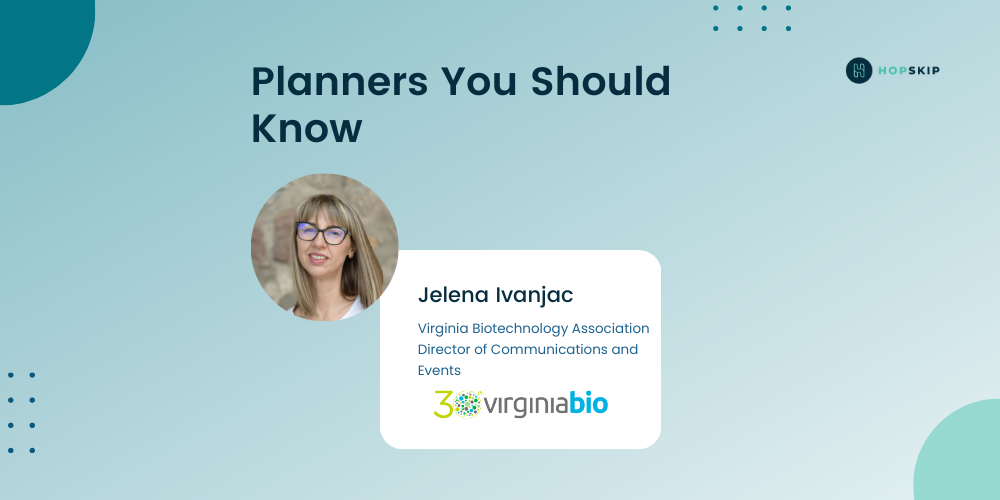Planners You Should Know - Jelena Ivanjac, Virginia Biotechnology Association
Jelena Ivanjac, of the Virginia Biotechnology Association, discusses how she honed her skills over the pandemic to now be in position to overcome the challenges that the new meetings/events landscape brings.
Luke Whalin
Jan 27, 2023

This post is part of the HopSkip Planner Spotlight Series where HopSkip spotlights planners across the industry to bring awareness of how they adapted to COVID-19, communicating and lessons learned and sharing how they are viewing the meetings and events industry in a post-pandemic world.
Name: Jelena Ivanjac
Company Name: Virginia Biotechnology Association
Job Title: Director of Communications and Events
Years of Experience: 20+
How did you get your start in the events industry? What made you pursue this role?
As a marketing strategist, I incorporated events into numerous clients' marketing plans. From industry and scientific conferences to trade shows to webinars and hackathons, most of my clients have had a need to create brand awareness and connect with prospects via events. I got more and more involved in the actual event organization over time. At Virginia Bio, events are the top marketing tactic we use to connect and grow the life sciences ecosystem.
How do you compare planning your first in-person event post-pandemic, to planning meetings/events pre- Covid? What was different and unique? What was similar?
What was your number one challenge in hosting your first in-person event(s) and how did you overcome it?
We were not entirely out of the pandemic when we held our first big in-person event since Covid19 shut the world down. We strive to make unforgettable networking events. But we didn't want to be remembered for creating a superspreader. Joke aside, it certainly added many new tasks to the plate. Providing masks, hand sanitizers, and plenty of space, so people feel comfortable roaming around. Still, it seemed unlikely that we would achieve the pre-Covid number of attendees.
If I had to describe it in one word, I would say uncertainty. After experimenting with a hybrid event with multiple in-person locations in September 2021, we learned all the challenges of trying to please both worlds, so to speak. We knew the next big event would be in-person or completely virtual. And so it happened in April 2022. But not without challenges. The planning process had started amid the strictest COVID-19 restrictions, while CDC guidance was frequently changing. In addition, a few months before our planned conference, another major event, the J.P. Morgan Healthcare Conference, was canceled. It happened in January 2022, only a few weeks before the event, with Moderna among the first companies to pull out of it. That certainly added some anxiety in our life sciences community. So, not only had we faced uncertainty in terms of not knowing if there would be another virus variant, but we also needed to predict if people would assume a risk to show up. As our event approached, we kept checking with the venue about their COVID-19 policy. That's another thing that is different today - events and venue's Covid-19 policies are in agreement. Luckily, all went exceptionally well, and we had a lot of attendees eager to get together after long isolation.
What is the top learning that you uncovered from the last two years that you’re implementing in your planning process today? (any other tips or tricks you want to share?)
The importance of a good team just went up to a whole new level. Whether virtual or in-person, finding reliable vendors and creating a trusting relationship is a win-win recipe for overcoming many obstacles and creating a great event. Yesterday was COVID, and tomorrow, who knows what new challenges we may need to face.
Definitely start earlier and follow up more frequently. If it takes too long and the communication seems to lead nowhere, perhaps there is a reason for it. So, take a sign and look elsewhere. Don’t force it.
Mostly to avoid unnecessary costs as the prices went up significantly, and hotel fees are sometimes unreasonably high for some services. For other details, I trust our hotel booking agent. Again, having a trusting vendor is golden.
Being more transparent about their current shortcomings. We are all aware that the hotel industry was hit hard by the pandemic and is still slowly recovering. There is no point in overpromising or hiding an inability to respond to an event organizer’s requests because, in the end, it all comes to the surface. It damages a hotel’s brand value as it affects the organizer.
Due to the pandemic, our events community had to evolve, adapt, and grow. Many planners started to embrace new technologies as a result of the pandemic. What new tech are you using today in your planning process as a result?
In addition to a few virtual events platforms, meeting software has become a new “Microsoft Office Suite” or a fundamental skill you should have to communicate successfully. I have used Zoom, Google Meet, Microsoft Teams, Discord, Notion… I am probably missing some.
Since education and relationships are two major pillars in the meetings and events industry, any suggestions on how other planners can learn and network with their peers across the industry?
With a general staff shortage, planners are becoming more supportive of each other. Local and national associations, social media groups, and conferences are all great sources of information and a key to keeping up with changes within the industry.